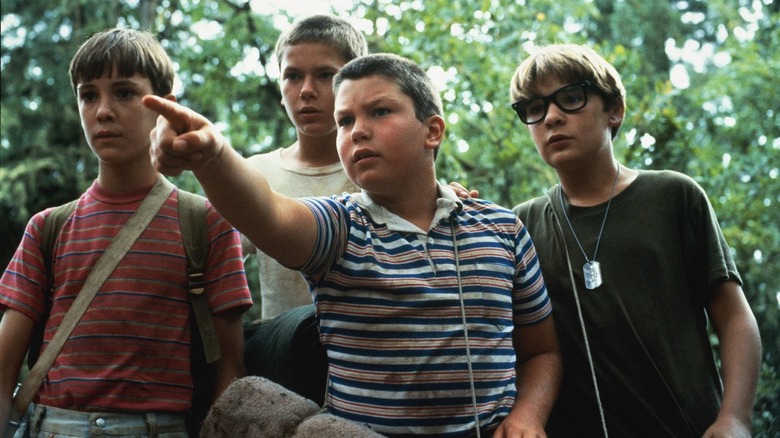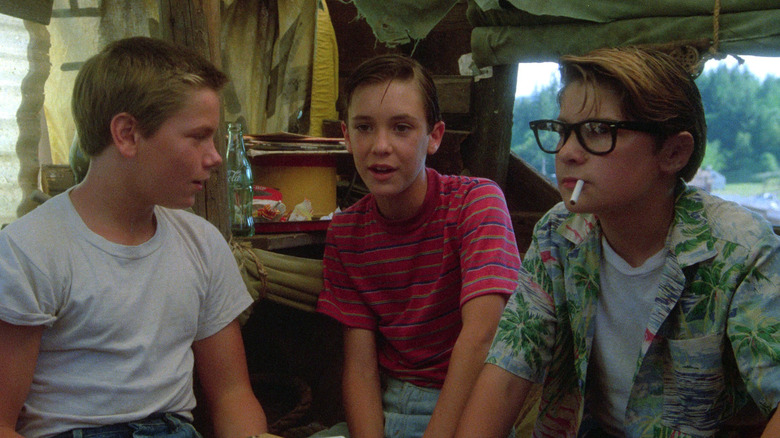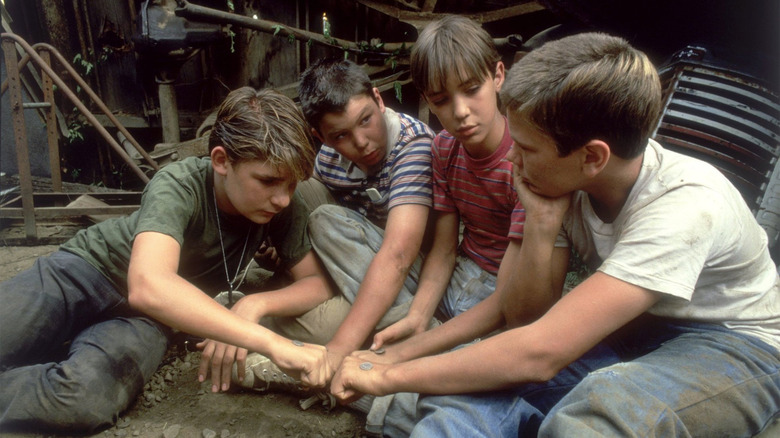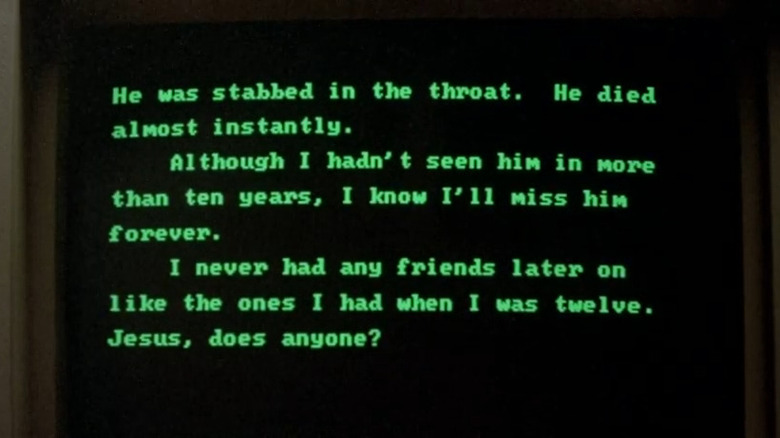Stand By Me Ending Explained: I'll Miss Him Forever
Rob Reiner's 1986 coming-of-age drama "Stand By Me" was based on Stephen King's short story "The Body," one of four stories from his 1982 collection "Different Seasons." King, as is frequently his wont, set "The Body" in the time of his own childhood (1960 for "The Body," and '59 for "Stand By Me"), using his story as a simultaneous self-injection of nostalgia as well as a harsh, critical reevaluation of the darkness lurking within seemingly-placid postwar suburban landscapes.
King and Reiner (both born in 1947) understood the double-edged sword of the nostalgia seen in "Stand By Me." On the one hand, it's pleasant and comforting to recall listening to The Chordettes' "Lollipop" on the radio while dreamily reliving halcyon memories of cussing and playing cards with your fellow 12-year-olds in a treehouse. From their perspective, that afternoon was the height of human experience. On the other hand, the 1950s were also a time of deep spiritual reckoning for the United States, and both King and Reiner sharply recall the parental abuse, bullying, violence, and neglect that was all too common among kids in small-town America. The four lead characters in "Stand By Me" are so funny and appealing that one almost ... almost ... forgets that Teddy (Corey Feldman) is missing an ear because his drunken father burnt it off in a mad fit of drunken rage.
"Stand By Me" is a coming-of-age story for a quartet of 12-year-olds, but it's also a coming-of-age story for a childish nation in desperate need to acknowledge the deep scars left behind by the War. We may have to walk down the tracks a bit to see it in the flesh, but death is laying off in the bushes.
Castle Rock, ME, 1959
The four adolescents in question are funny and confident — and deeply wounded. There's Teddy, and then there's the awkward and fearful Vern (Jerry O'Connell), the intelligent and soulful Chris (River Phoenix), and the creative and observant Gordie (Wil Wheaton). Gordie, also the film's narrator (Richard Dreyfuss narrates as the adult version of the character), has become a ghost in his own home after the death of his older brother Denny (John Cusack in flashbacks). Denny was a celebrated local football star. Gordie, in comparison, couldn't help but be a disappointment. The boys have all just reached the age when their parents are at peace with not paying any attention to them. Chris mentions that his father beats him regularly, and Teddy's father was recently committed to an asylum.
The neglect, they find, also avails them the freedom to arrange a grand quest for what is essentially the last summer of their childhoods. Vern reveals that a local boy, Ray Brower, was recently hit by a train and killed, and his body has remained by train tracks miles and miles away. The four boys, thinking it would be intense and cool — and that discovering a missing kid would get them on TV — arrange a multiple-day hike, just the four of them, complete with bedrolls and provisions, to go see Ray.
On their trip, with the solitude to think and converse, each of the boys begins to face their own inner pain. Teddy breaks down when a local junkyard owner uses the word "loony" is describe his father. Chris breaks down when he acknowledges that his family's bad reputation left him stained (one of Chris' teachers even framed Chris for a small robbery). Gordie breaks down when he talks about his dead brother and the ensuing neglect. And poor Vern merely looks death in the face.
Death is cool, right?
The kids in "Stand By Me," like most adolescents, assume death to be something edgy and cool. Death, as horror movies teach us, can be a lurid form of raucous entertainment. As a young person, death is something distant, something you shouldn't be concerned with, something that happens to other people. Immortality belongs to kids and mortality belongs to adults.
The central quartet of "Stand By Me" are all 12. They are on the early cusp of maturity. They have access to swear words and cigarettes, but still cling to certain childhood totems; Vern points out that flipping four coins that come up tails is a bad omen. But they haven't yet faced the death and the violence that hangs in the air around them, and, indeed, that they're carrying with them; it's established early on as well that the boys are bringing a real loaded gun on their journey, snuck out of Chris' dad's collection. That gun will provide them, as they assume, with power over the local bully (Kiefer Sutherland), but also stands out as a symbol of having crossed some sort of line.
Late in the film, when Gordie puts his finger on the trigger, he's taking death into his own hands. He is taking control of the violence that, he now sees openly, is a big part of growing up in the 1950s.
Overcoming
But "Stand By Me" is not a story of succumbing. It is a tale of survival and maturity.
While there is a dark catharsis in staring death in its bloodied face — "The kid wasn't sick, the kid wasn't sleeping, the kid was dead" — Gordie, Vern, Teddy, and Chris also realize that true maturity means separating mere mortality from the urge to cause it. The world constantly threatens and hurts these four boys. They manage to come out on the other side without having been stained; none of them are poised to become an abuser themselves.
When the four boys part at the end of their quest — the sun setting on the summer — they all know everything has changed. With their childhoods at an end, they are now destined to drift apart, to find their own identities outside the safe bubble of youth. And, as the 1960s begin, revolution is set to begin in the United States. The darkness hiding in postwar America is about to be exposed, and the nation was to enter uneasy adolescence. We can long for childhood, but we also must acknowledge when that childhood is not the rosiest thing. Something is lost, but something else will always be gained.
"I never had any friends later on like the ones I had when I was 12. Jesus, does anyone?"



